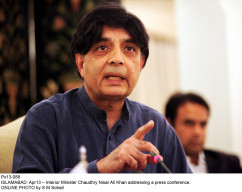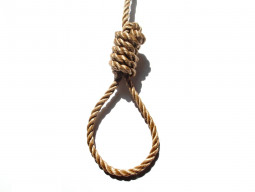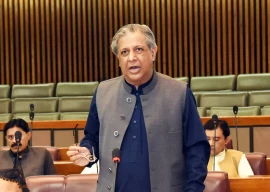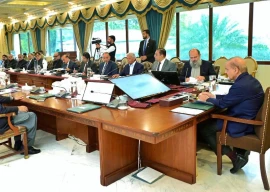
PESHAWAR:
The Khyber-Pakhtunkhwa (K-P) Assembly passed a unanimous resolution on Wednesday condemning the sentences and execution of Jamaat-e-Islami (JI) Bangladesh leaders on charge of war crimes.
Various international organisations and governments differ on the number of people killed in the nine-month war of secession in 1971.
The Bangladesh Supreme Court upheld the death sentence for Mohammad Kamaruzzaman, the assistant secretary general of the JI, earlier in November. Kamaruzzaman has been found guilty of mass murder, torture and abductions, some centered around Sohagpur town known as the ‘Village of Widows’. It is said 120 unarmed farmers were lined up and slaughtered in paddy fields.
If hanged, he will be the second leader whose death sentence was carried out after JI senior leader Abdul Kader Mullah.
The resolution was moved by Parliamentary Secretary for Finance Muhammad Ali, who is from JI. It was endorsed by the Pakistan Tehreek-e-Insaf’s (PTI) Soran Singh, Awami Jamhoori Ittehad Pakistan’s (AJIP) Abdul Munim, Pakistan Peoples Party’s (PPP) Sardar Hussain, opposition leader Maulana Lutfur Rehman, Minister for Public Health Engineering Shah Farman and Pakistan Muslim League-Nawaz parliamentary leader Sardar Aurangzeb and other members.
According to the resolution, the K-P Assembly condemned the “unjust and cruel” sentences, which include life in prison and hanged till death, handed to JI’s leaders. The resolution argued the leaders were being punished at the behest of the “pro-Indian” government of Prime Minister Hasina Wajid. “Sentencing JI leaders is also a violation of a treaty between Sheikh Mujeebur Rehman, Indira Ghandi and Zulfikar Bhutto, also endorsed by Britain, United States and other countries, which stated no one will be tried for the 1971 war.”
The resolution went on to add the recent sentencing of the leaders was also a violation of international treaties and human rights.
Accusing Bangladesh of “state terrorism”, the document reminded Islamabad of its duty to raise a voice internationally against these punishments as the leaders were defending Pakistan in 1971 as Pakistani citizens. It argued after the creation of Bangladesh, the same leaders not only accepted Bangladesh’s constitution; they participated in the electoral process and were made ministers.
The resolution concluded the Bangladesh government was sentencing JI’s leaders to appease India and condemned the act.
The house unanimously approved this resolution.
Agricultural losses from hailstorms
During question hour, the house was informed that under the West Pakistan Natural Calamities (Prevention and Relief) Act 1958, the government could not compensate losses to agriculture produce.
The question was raised by Jamiat Ulema-e-Islam Fazl lawmaker from Buner, Mufti Fazal Ghafoor. In response, the agriculture department said 3,273 acres were damaged out of 4,524 acres of standing crops.
Ghafoor demanded the government legislate to compensate for damages to agricultural produce in natural calamities. Minister for Agriculture Akramullah Gandapur also backed the move and the matter was referred to the relevant committee.
The assembly unanimously passed the K-P Senior Citizens Bill 2014 with amendments, while the K-P Prevention of Conflict of Interest bill was referred to the select committee on the suggestion of Qaumi Watan Party’s parliamentary leader Sikandar Sherpao.
Public-Private partnership for health
Ghafoor also raised the issue of handing control of the district health office to NGO Marlin and that the coordinators of this NGO were appointed and given budgetary control, bypassing officials who had been serving for years. He said Torghar, Lower Dir and Kohistan; Civil Hospital Pabbi Nowshera; and other health facilities have been handed over to NGOs.
Ghafoor asked the matter to be referred to the relevant committee. However, Inayatullah Khan opposed the request, saying these institutions have been transferred under public-private partnerships.
Published in The Express Tribune, November 20th, 2014.
COMMENTS (4)
Comments are moderated and generally will be posted if they are on-topic and not abusive.
For more information, please see our Comments FAQ




























































All the war criminals should bring under the trial for committing mass killing i,e,genocide.No body is above the law.To establish the rule of law the trial of mass killer must.As it is our internal matter, do not care the resolution.
Can we move on from this now already? What happens in Bangladesh is now none of our matter. As a Pakistani, I wish they never separated, but the fact is that they did. Let us move on.
I wonder if we would ever learn our lesson. Isn't it an internal matter of a sovereign country?
i am a resident of KP and this resolution does not represent my feelings in this matter.